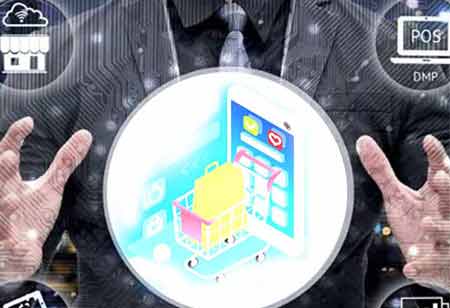THANK YOU FOR SUBSCRIBING
Be first to read the latest tech news, Industry Leader's Insights, and CIO interviews of medium and large enterprises exclusively from Education Technology Insights
Transformative Learning: The Shift Toward Social-Emotional Intelligence Platforms
Social-emotional learning (SEL) platforms have gained significant traction in recent years as educational institutions, workplaces, and communities recognize the importance of emotional intelligence in overall success.

By
Education Technology Insights | Friday, February 14, 2025
Stay ahead of the industry with exclusive feature stories on the top companies, expert insights and the latest news delivered straight to your inbox. Subscribe today.
Transformative Learning: The Shift Toward Social-Emotional Intelligence Platforms
Social-emotional learning (SEL) platforms have gained significant traction in recent years as educational institutions, workplaces, and communities recognize the importance of emotional intelligence in overall success. SEL is no longer viewed as a supplementary aspect of education but as an integral component of personal and professional development. The growing emphasis on mental health, technological advancements, and an increasing demand for holistic education are key factors fueling the expansion of SEL platforms. The shift towards a more emotionally intelligent society has led to increased funding, policy support, and innovative technological interventions in the field of SEL.
The modern education system recognizes that academic performance alone cannot prepare students for success. Emotional resilience, conflict resolution, and interpersonal skills are equally crucial in today's dynamic world. Schools actively integrate SEL into their curricula to ensure students develop emotional intelligence and cognitive skills. Mental health concerns, exacerbated by social pressures and the challenges of the digital age, have highlighted the need for structured SEL programs. With rising cases of anxiety, depression, and stress among students and professionals, SEL platforms serve as practical tools to foster emotional strength and coping mechanisms.
Integrating artificial intelligence (AI), machine learning, and data analytics enables personalized learning experiences, making SEL more interactive and engaging. Digital platforms offer real-time feedback, virtual reality (VR) simulations, and gamified exercises that allow individuals to practice emotional intelligence in realistic scenarios. AI-driven chatbots and emotion recognition tools help users track their emotional responses and receive tailored guidance for improvement. Remote and hybrid learning models have further accelerated the adoption of digital SEL solutions, ensuring continuous support for students and employees in virtual environments.
The expansion of SEL platforms is also influenced by changing societal and workplace dynamics. Organizations increasingly recognize emotional intelligence's role in leadership, collaboration, and workplace culture. Employers seek professionals who effectively manage stress, communicate empathetically, and work cohesively in teams. Businesses are integrating SEL training programs into their employee development initiatives. Leaders undergo SEL-based coaching to enhance their decision-making skills and foster a more inclusive and positive work environment.
Schools, businesses, and organizations actively incorporate SEL programs to enhance individuals' self-awareness, emotional regulation, empathy, and social skills. It signifies a shift in corporate priorities, where emotional well-being is considered as important as technical expertise. Rather than treating SEL as an isolated component, educators embed emotional intelligence training into daily classroom activities. Math, science, and language lessons now incorporate collaboration, self-reflection, and critical thinking elements to develop intellectual and emotional skills.
SEL platforms are designed to address diverse cultural perspectives and experiences, ensuring that individuals from different backgrounds can relate to and benefit from the programs. SEL is gaining traction beyond the education sector. Businesses, community organizations, and sports teams leverage SEL principles to build stronger relationships and enhance team dynamics. Unlike academic subjects with transparent grading systems, emotional intelligence is complex and challenging to quantify. Educators and organizations struggle to track progress and determine the impact of SEL interventions.
Resistance to change remains challenging, particularly in traditional educational settings where teachers and administrators may hesitate to integrate SEL into existing curricula. Some educators lack adequate training in SEL implementation, making it difficult to deliver high-quality programs. Digital accessibility issues pose a challenge, particularly for underserved communities with limited technological resources. Without proper access to digital SEL platforms, students and employees in disadvantaged areas may miss crucial emotional development opportunities.
Developers and educators focus on evidence-based approaches and research-backed methodologies to address these challenges. Efforts are being made to create standardized assessment tools that track emotional growth and provide actionable insights. These tools incorporate self-report surveys, observational assessments, and AI-driven analytics to gauge emotional intelligence development. Training workshops, certification courses, and peer mentoring initiatives are being introduced to enhance SEL delivery in classrooms and workplaces.
Another solution is fostering strong collaborations between technology companies, educators, policymakers, and mental health professionals. Partnerships between these stakeholders ensure that SEL platforms are designed to be accessible, user-friendly, and impactful. Government agencies are also allocating funding for SEL initiatives and incorporating SEL into national education policies. Businesses are investing in SEL programs as part of their corporate social responsibility initiatives, further promoting emotional intelligence development on a broader scale. Integrating AI, VR, and gamification will further enhance the interactive nature of SEL programs, making learning more immersive and compelling.
The success of SEL platforms depends on continuous innovation, widespread accessibility, and a commitment to fostering emotional intelligence across various sectors. By addressing existing challenges and leveraging technological advancements, SEL platforms will play a crucial role in developing emotionally resilient individuals who can contribute positively to society. The growing recognition of SEL's value signals a future where emotional intelligence is not just an option but a fundamental aspect of learning and professional development. As these platforms gain momentum, they will continue redefining education, workplaces, and interpersonal relationships, ultimately shaping a more emotionally aware and empathetic world.







